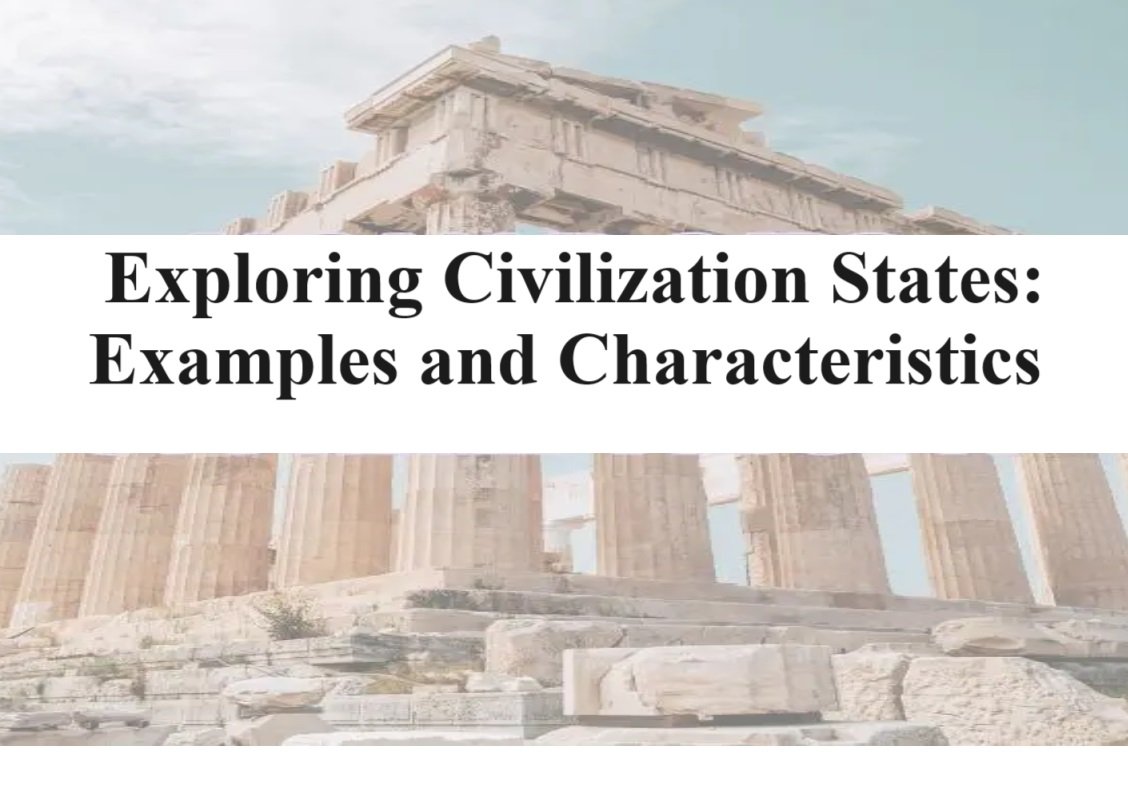Exploring Civilization States: Examples and Characteristics
Introduction
A civilization state is a political entity that is characterized by a strong sense of cultural identity and a shared set of values, beliefs, and traditions. These states are often formed by a group of people who share a common language, history, and cultural heritage. In this blog post, we will explore some examples of civilization states and examine their unique characteristics.
China: The Middle Kingdom
China, often referred to as the Middle Kingdom, is one of the most prominent examples of a civilization state. With a history spanning thousands of years, China has developed a rich cultural heritage that is deeply ingrained in its society. The Chinese people have a strong sense of national identity and take great pride in their history, language, and traditions.
One of the defining features of China as a civilization state is its centralized political system. Throughout its history, China has been ruled by a series of dynasties, each claiming the Mandate of Heaven to justify their rule. This centralized governance has helped to maintain a sense of unity and cultural continuity within the country.
Another important aspect of China as a civilization state is its emphasis on Confucianism, a philosophy that promotes social harmony and respect for authority. Confucian values, such as filial piety and the importance of education, have shaped Chinese society and continue to influence its cultural norms and practices.
India: Unity in Diversity
India is another example of a civilization state, although it is unique in its diversity. With over 1.3 billion people and more than 2,000 distinct ethnic groups, India is a melting pot of cultures, languages, and traditions. Despite this diversity, India has managed to maintain a sense of unity through its shared history and values.
One of the key factors that contribute to India’s identity as a civilization state is its ancient civilization and rich cultural heritage. The Indus Valley Civilization, which dates back to around 2500 BCE, is one of the oldest urban civilizations in the world. This ancient civilization laid the foundation for many of the cultural and religious practices that are still prevalent in India today.
Another important aspect of India as a civilization state is its religious diversity. Hinduism, Buddhism, Jainism, and Sikhism all originated in India and have had a profound influence on its culture and society. Despite the religious diversity, there is a strong sense of tolerance and acceptance among the Indian people, which helps to foster a sense of national unity.
Japan: Tradition and Modernity
Japan is a fascinating example of a civilization state that has successfully blended tradition and modernity. With a unique mix of ancient customs and cutting-edge technology, Japan has managed to preserve its cultural heritage while embracing global influences.
One of the defining features of Japan as a civilization state is its strong emphasis on traditional values and customs. The Japanese people have a deep respect for their history and take great pride in their cultural traditions, such as tea ceremonies, flower arranging, and martial arts. These traditions are deeply ingrained in Japanese society and continue to play a significant role in daily life.
At the same time, Japan is known for its technological advancements and innovative industries. From electronics and robotics to automotive manufacturing, Japan has made significant contributions to the global economy. This blend of tradition and modernity is a unique characteristic of Japan as a civilization state.
Conclusion
Civilization states are political entities that are defined by a strong sense of cultural identity and shared values. Examples such as China, India, and Japan demonstrate the diverse ways in which civilization states can manifest. Whether through a centralized political system, religious diversity, or a blend of tradition and modernity, civilization states play a crucial role in shaping the cultural and political landscape of a nation.
By embracing their unique cultural heritage and fostering a sense of national unity, civilization states can create a strong foundation for social cohesion and economic development. Understanding the characteristics of civilization states can provide valuable insights into the complexities of the world we live in and the diverse societies that exist within it.
